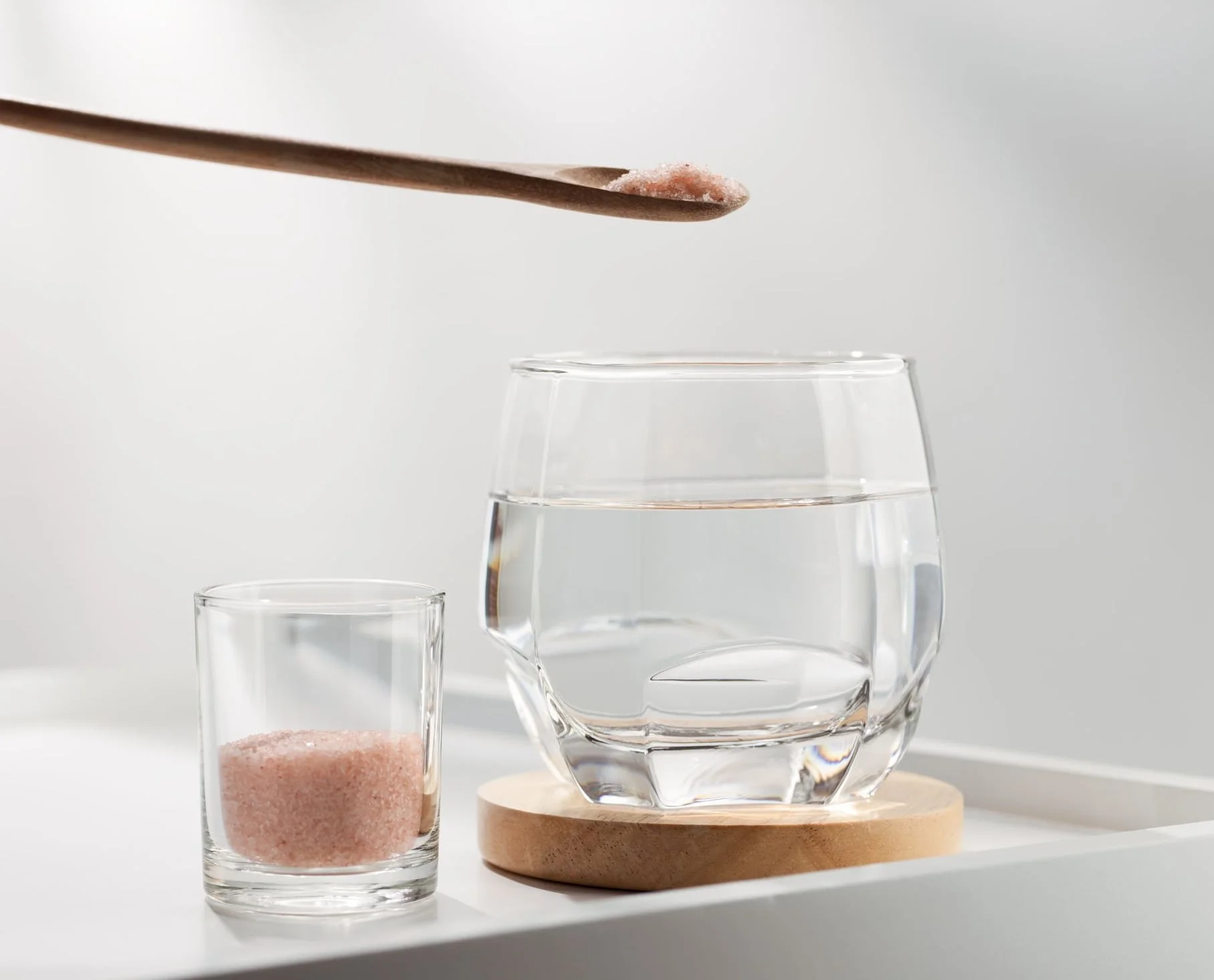Last Updated on: 13th December 2025, 05:48 am
Salt Water to Heal Gums: The Complete Guide
Gum health is a crucial aspect of oral hygiene. Gums may present bleeding or other visible alterations. It is essential to maintain a healthy smile and prevent oral diseases. Gums play a fundamental role not only in dental health but in the overall well-being of the body. Here we will talk about how the traditional remedy of “salt water to heal gums” can be a solution while also being highly accessible to take care of our gums.
You’ve probably already heard about the benefits of salt water or have even used it to treat sore throat, or gums, or relieve pain after a dental procedure. Salt water rinsing is an easy and accessible home remedy used to relieve toothache and mouth discomfort, but what are the benefits of this simple solution?
Why Choose Salt Water to Heal Gums?
Did you know that salt water has been used since BC? It has been considered a remedy for numerous health problems over time, including conditions that mar our oral health. It has natural antiseptic properties to help us maintain and it is economical, easy to prepare, and accessible to everyone. For these reasons, it can be considered an ideal option for gum problems and some oral conditions.
How Salt Water Helps Heal Gums
Salt water is an ancient home remedy that has been used to treat various oral conditions because it stops the growth of bacteria. It also has the ability to create an alkaline environment, thereby reducing the acidic environment found in the mouth. Bacteria related to oral problems and/or conditions prefer an acidic environment; and salt water, by providing an alkaline environment, helps us have less inflamed and healthier gums.
1. Reduction of Inflammation:
Salt water rinses help reduce inflammation and pain in swollen gums thanks to their osmotic properties, and mineral, and trace element content, all of which work together to reduce inflammation and reduce proinflammatory substances.
Rinsing the mouth with salt water creates an extraction of fluids from the inflamed tissues, resulting in less pain and healthier gums, making them less susceptible to irritation or infection and consequently facilitating the maintenance of an adequate and effective oral hygiene routine.
2. Acceleration of Healing of Oral Wounds:
Its effectiveness in healing lies in its antiseptic and disinfectant properties. Salt water creates a hostile environment for bacteria, preventing its growth and reproduction, thus avoiding possible infections. As mentioned, salt water reduces excess fluid in the tissues, helping to accelerate the healing process.
3. Decreased Bacterial Growth:
Salt water as a natural antiseptic helps reduce bacterial growth. By altering the osmotic balance within the cells leading to their dehydration and death, salt prevents the accumulation of bacteria in the mouth and consequently reduces the growth of bacterial plaque. In the long run, it reduces the risk of gum infection such as gingivitis, and the appearance of dental cavities.
The Science Behind Saltwater Rinses
The effectiveness of salt water rinses in curing inflamed gums and/or oral conditions is based on the scientific principle of osmosis. A saline solution creates a hypertonic environment around bacterial cells. This induces the extraction of fluids from these cells, leading them to a state of dehydration and eventually causing their death. This mechanism causes an improvement in the pH of the mouth while creating an alkaline environment in which bacteria can barely survive.
Preparation of a Salt Water Rinse
Performing salt water rinses is simple and accessible:
1. Warm water.
2. 1 teaspoon salt.
3. Stir until the salt has completely dissolved.
4. Use the solution to rinse your mouth for 30 seconds.
5. Spit.
Effective Remedies with Salt Water to Heal Gums
1. After a tooth extraction:
You must wait 24 hours after tooth extraction to rinse your mouth. These rinses must be done gently to avoid removing the clot from the dental socket. It is recommended to do so after meals to ensure that the mouth remains clean, eliminating bacteria from the area and avoiding a possible infection.
2. Gum infection:
Salt water rinses help a gum infection by removing fluid from the infected inflamed gums, preventing the formation of a breeding ground for bacteria and, consequently, possible infection and/or gingivitis.
3. Ulcers or canker sores:
Salt water rinses help reduce irritation. Ulcers or canker sores usually heal on their own in one or two weeks, but we can relieve the discomfort and foster rapid healing with the use of salt water.
4. Bleeding gums:
Salt water rinses can soothe the bleeding and painful gums, helping to eliminate the accumulation of bacterial plaque and infections. We should not leave brushing and flossing aside. A complete oral hygiene routine is essential to achieve healthy gums.
5. For Sore Throat and Oral Infections:
To relieve pain and combat infections in the throat and mouth, salt water is particularly effective. Thanks to its ability to eliminate bacteria, mitigate pain, and dissolve mucus, it is a very good recommendation in cases of symptoms that precede or accompany a sore throat.
Using salt water as a complement to daily oral care can be beneficial but should not replace fundamental practices such as brushing and flossing. Additionally, the use of salt water rinses should be temporary and not a permanent solution. Maintaining a balance is essential and following a dentist’s instructions will ensure that oral health benefits are maximized without taking unnecessary risks.
Tips to Maximize the Benefits of Saltwater Rinses
● Duration and Frequency of rinses: It is recommended to do them 2 to 3 times a day, being most useful and beneficial after meals.
● Combination with other oral health practices: We must not forget or put aside tooth brushing, flossing, and periodic dental check-ups.
When to Go to the Dentist
It is important to know when curing gums with salt water is not enough and professional care is required. Signs such as persistent bleeding, severe pain, or recurring infections are indicative that you should seek help from a dentist.
Conclusion
Salt water to heal gums is an effective and accessible practice that complements your oral care routine. However, it does not replace the need for complete oral hygiene or regular visits to the dentist. Integrating saltwater rinsing into our daily routine can offer significant benefits to the health of our gums, positively reflecting overall health and well-being.
Frequently Asked Questions
Can salt water rinse replace toothpaste?
No, although it is beneficial for gum health, it should complement regular brushing and flossing, not replace them.
How often should I rinse my mouth with salt water?
Once or twice a day, especially after meals or dental work, for best results.
Do salt water rinses have side effects?
They are generally safe, but excessive use can cause dry mouth or damage to tooth enamel. Use them as directed.
Can children use salt water rinses for gum health?
Yes, under adult supervision to prevent swallowing.
Is it safe to swallow salt water during rinsing?
Small amounts are not harmful, but it is best to avoid swallowing large amounts.
Share:
References
1. Healthline. (Jun, 2021). How Do Saltwater Rinses Help Your Oral Health?. https://www.healthline.com/health/dental-and-oral-health/salt-water-rinse
2. VeryWellHealth. (Jan, 2024). How to Make Your Own Salt Water Rinse for Gums. https://www.verywellhealth.com/how-to-make-saline-solution-salt-water-mouth-rinse-4109216#:~:text=A%20salt%20water%20(saline)%20rinse,8%20ounces%20of%20lukewarm%20water
3. Drugs. (Jun, 2023). Does salt water help mouth ulcers?. https://www.drugs.com/medical-answers/salt-water-help-mouth-ulcers-3574063/
4. Medline Plus. (Jan, 2022). Bleeding gums. https://medlineplus.gov/ency/article/003062.htm
5. American Dental Association. (2013). Dry Socket. https://www.mouthhealthy.org/all-topics-a-z/dry-socket/
6. Medline Plus. (Jan, 2022). Trench mouth. https://medlineplus.gov/ency/article/001044.htm
-
Nayibe Cubillos M. [Author]
Pharmaceutical Chemestry |Pharmaceutical Process Management | Pharmaceutical Care | Pharmaceutical Services Audit | Pharmaceutical Services Process Consulting | Content Project Manager | SEO Knowledge | Content Writer | Leadership | Scrum Master
View all posts
A healthcare writer with a solid background in pharmaceutical chemistry and a thorough understanding of Colombian regulatory processes and comprehensive sector management, she has significant experience coordinating and leading multidisciplina...


















